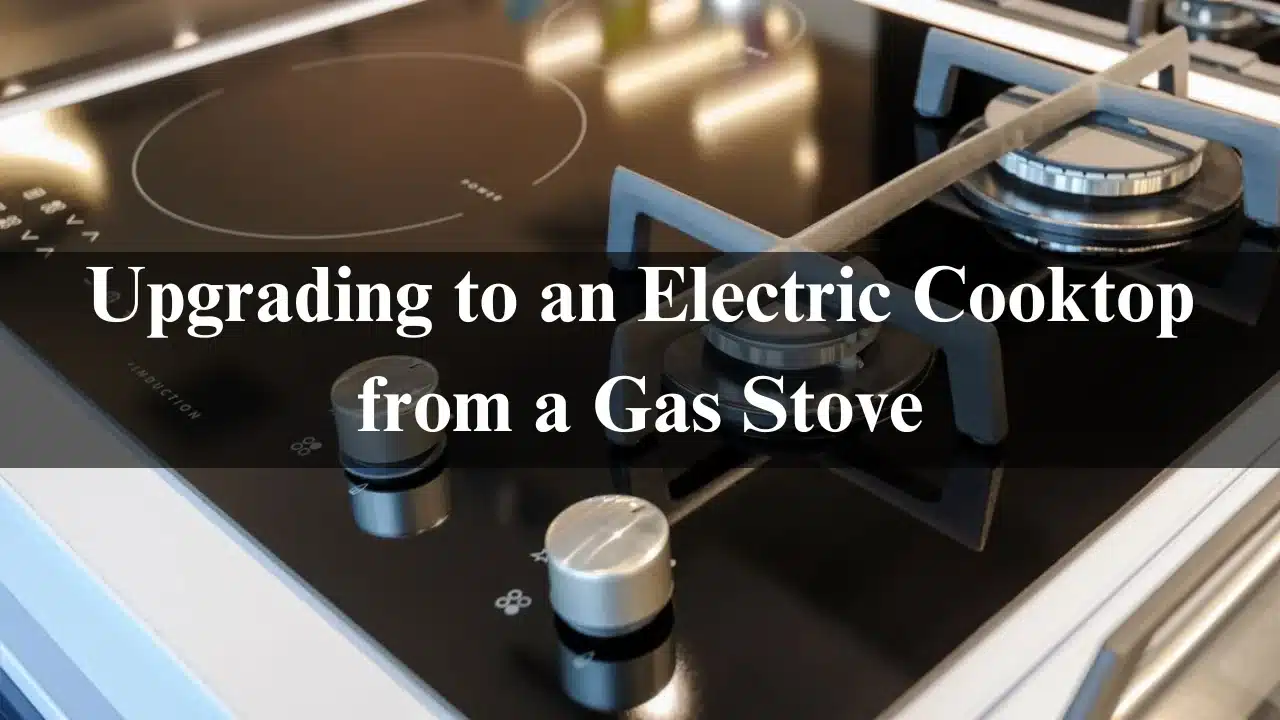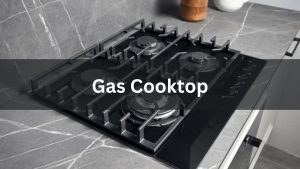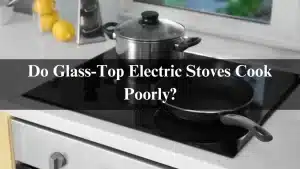Hey there! Have you ever considered replacing your gas stove with an electric cooktop? If you’re curious about making the switch, you’re not alone. More and more people are upgrading to electric cooktops, and there are plenty of good reasons for that!
Why should you care? Switching from gas to electricity can make cooking easier, safer, and even better for the environment. In this article, we’ll walk through everything you need to know about upgrading to an electric cooktop—from how they work to what you’ll need to do to get started.
Table of Contents
Why Upgrading to an Electric Cooktop?
Upgrading to an electric cooktop offers numerous advantages, from energy efficiency to modern aesthetics. Unlike gas stoves, electric cooktops provide smoother temperature control, making cooking more precise and predictable. Additionally, with environmental concerns growing, many are looking for ways to reduce carbon footprints. This switch not only simplifies daily cooking but also aligns with sustainability goals.
Gas vs. Electric: What’s the Big Difference?
When cooking, gas and electric stoves do the same thing: heat food. But they work in very different ways. Let’s examine how each one works.
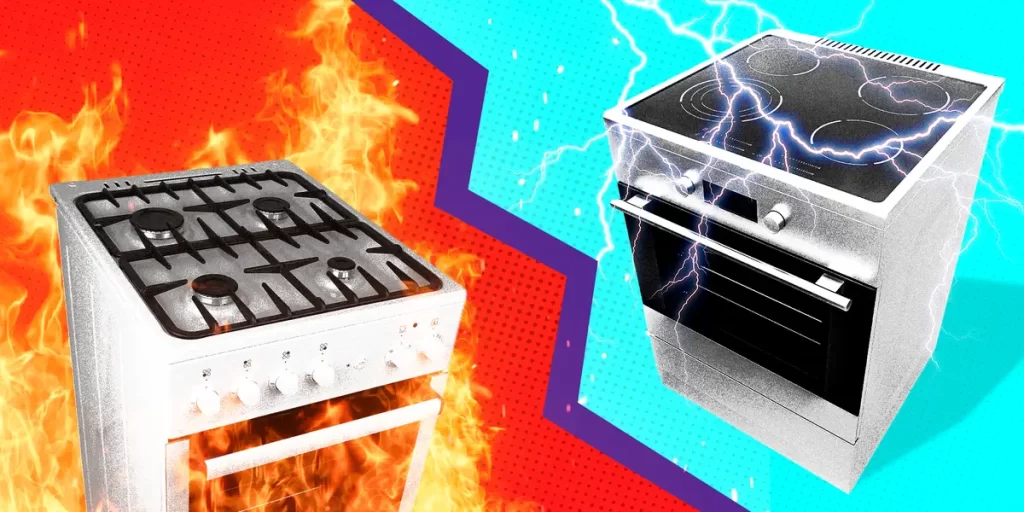
How do Gas Stoves Work?
Gas stoves heat your pots and pans with a flame. You turn a knob, gas comes out, and then whoosh—the flame appears when you ignite it! Gas stoves work because natural gas or propane is burned, creating heat that cooks your food. Think of it like a campfire but controlled. The flame is visible; you can turn it up or down depending on how hot you want it to be.
How Electric Cooktops Work?
Electric cooktops, on the other hand, don’t use a flame. Instead, they use electricity to heat metal coils or a smooth surface on the stove. The electricity flows through the coils and heats them, transferring the heat to your pots and pans. Upgrading to an Electric cooktop are like magic—you don’t see a flame, but the heat is there, working quietly and efficiently.
Why Choose an Electric Cooktop?
So, why should you upgrading to an electric cooktop? Here are some reasons people love them.
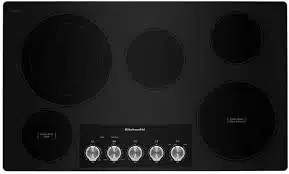
The Perks of Going Electric
- Cleaner and Easier to Maintain
Electric cooktops often have a smooth, glass surface that’s easy to clean. No more scrubbing around burners like with a gas stove! Just a simple wipe and you’re done. Isn’t that nice? - Better for the Environment
Guess what? Electric cooktops can be more eco-friendly, especially if your electricity comes from renewable sources like solar or wind. Unlike gas stoves, electric cooktops don’t release harmful gases into the air. - Precise Heating
Electric cooktops offer great control over cooking temperatures. Some electric stoves allow you to fine-tune the heat settings to the desired level. Say goodbye to burning food or undercooking meals!
Is It Safer?
Yes! One big advantage of Upgrading to an electric cooktops is safety. Since there’s no open flame, there’s less risk of fire. Plus, most electric cooktops cool down quickly once you turn them off, making accidental burns less likely.
Types of Electric Cooktops
Radiant Coil Cooktops
This traditional electric cooktop design uses heated coils to cook food. While they are less efficient and take longer to heat, they remain a budget-friendly option for those looking to upgrade.
Smoothtop Electric Cooktops
These feature a smooth, glass-ceramic surface with radiant heating elements underneath. They provide a sleek, modern look and are easier to clean than coil models, though they take time to cool down.
Induction Cooktops
Induction cooktops use electromagnetic energy to heat pots and pans directly, making them the most energy-efficient and fastest option. They offer precise control and remain cool to the touch, reducing the risk of burns.
Choosing the Right Electric Cooktop for Your Kitchen
Size and Configuration
Choosing the right size for your electric cooktop depends on your kitchen space and cooking habits. A 30-inch model works for most kitchens, while larger families or avid cooks might prefer a 36-inch model. Consider whether you want a standalone cooktop or a range with an integrated oven.
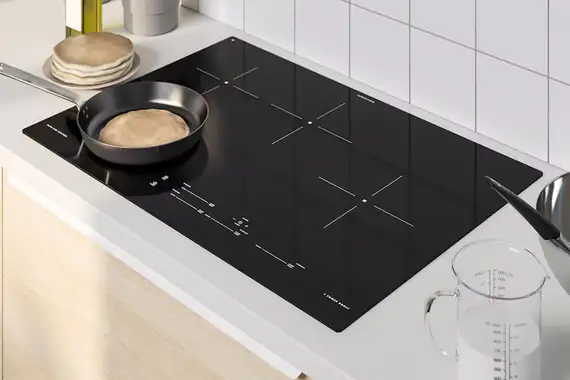
Features to Look For
When selecting an electric cooktop, look for features such as touch controls, child safety locks, and variable heat settings. Induction models may also come with pan detection features, automatically adjusting heat based on the pan size.
Brand and Warranty Considerations
Well-known brands like GE, Samsung, and Bosch offer reliable electric cooktops with strong warranties. Look for models that provide at least a 1-year warranty for peace of mind.
How to Make the Switch?
Now that you know why electric cooktops are awesome, let’s talk about switching from gas to electric. Don’t worry—it’s not as hard as it sounds!
Prepping Your Kitchen
Before upgrading to an electric cooktop, you’ll need to ensure your kitchen has the right setup. Electric cooktops need a special electrical outlet that provides more power than your standard outlet. This is called a 220-volt outlet. (Think of it as a “super” outlet that can handle more energy!)
If your kitchen doesn’t have one, you might need to hire an electrician to install it. But don’t worry—once that’s done, you’re good to go.
Getting the Right Size
Not all cooktops are the same size, so you’ll need to measure your current stove space. Most cooktops come in standard sizes, like 30 inches or 36 inches. Grab a tape measure, check the width, and make sure the new cooktop will fit in the same spot.
Hiring a Professional vs. DIY
While some homeowners may feel comfortable installing an electric cooktop, hiring a professional is often safer. A certified installer can handle the electrical work, ensuring everything meets safety standards and preventing costly mistakes.
Cost of Upgrading to an Electric Cooktop
Cooktop Price Range
Electric cooktop prices vary depending on the type. Radiant coil models cost around $300, while high-end induction cooktops cost $2,500 or more. Smoothtop models typically range from $500 to $1,500.
Installation Costs
The installation costs will depend on your kitchen’s existing wiring and layout. Expect to spend between $200 and $500 for professional installation. The cost could be higher if you need electrical upgrades or custom cabinetry adjustments.
Long-Term Savings
Although electric cooktops may come with a higher upfront cost, their energy efficiency can lead to savings in monthly utility bills. Additionally, less frequent maintenance and easier cleaning can save time and money.
Cooking on an Electric Cooktop: What to Expect
Cooking on an electric cooktop might initially feel different, but with a few tips, you’ll be a pro in no time!
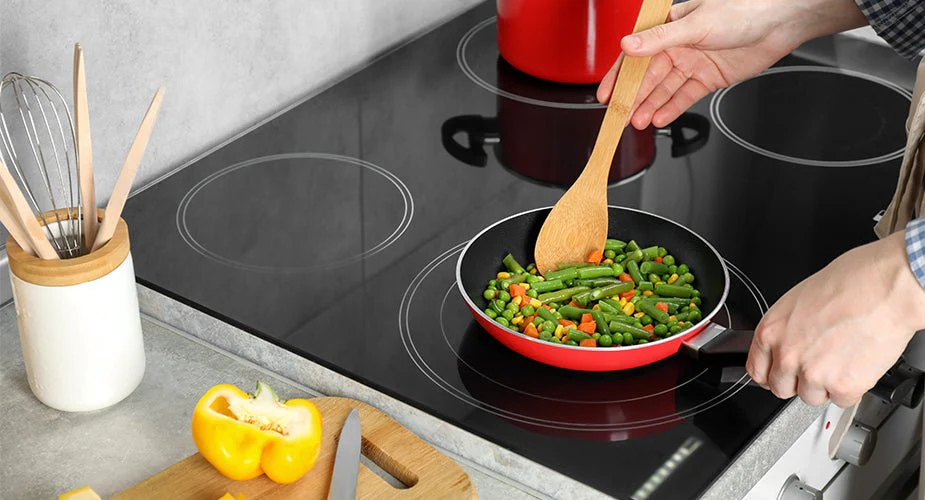
Heating and Cooking Times
Electric cooktops take a little longer to heat up than gas stoves. But don’t worry—it just means you’ll need to plan. The good news is that they hold the heat well once they’re hot. Your food will stay warm longer, which is perfect for slow-cooked meals.
Choosing the Right Cookware
Electric cooktops work best with flat-bottomed cookware. The heat needs to be spread evenly across the pan. If your pan is bumpy or warped, it won’t heat up properly. If you don’t already have flat-bottomed pots and pans, this might be a good time to invest in some!
Environmental Impact: Gas vs. Electric
Upgrading to an electric cooktop reduces reliance on fossil fuels. Gas stoves emit carbon dioxide and other pollutants during use, while electric models, especially those powered by renewable energy, contribute to a cleaner environment. Induction cooktops, in particular, offer an eco-friendly option by consuming less energy.
Maintenance and Cleaning Tips for Electric Cooktops
Regular maintenance keeps your electric cooktop functioning smoothly. To prevent stains, clean spills immediately, especially on smooth tops and induction surfaces. For radiant coil cooktops, make sure the coils remain free from debris. Avoid using abrasive cleaners, as they may damage the surface.
Common Mistakes to Avoid When Upgrading
- Ignoring electrical requirements: Make sure your home has the correct wiring.
- Not measuring space accurately: Ensure the cooktop fits your counter space.
- Choosing based solely on price: Prioritize energy efficiency and safety features over cost.
- Skipping professional installation: Improper installation can lead to safety hazards and future issues.
Real-Life Stories: People Who Made the Switch
Let’s hear from a few people who upgraded from gas to electric and loved it.
- Sarah’s Story: “I was tired of cleaning around the burners on my gas stove. When I upgrading to an electric cooktop, I couldn’t believe how much easier it was to keep clean! Now I spend less time scrubbing and more time enjoying my meals.”
- John’s Experience: “At first, I missed the flame from my gas stove, but after a few weeks, I got used to the smooth surface. Now, I wouldn’t go back to gas. It’s safer for my kids, and I love how it looks in my kitchen.”
Key Takeaways
- Electric cooktops are easy to clean, better for the environment, and safer than gas stoves.
- They use electricity instead of a flame, so you’ll need a special outlet in your kitchen.
- Cooking on an electric cooktop might take some time, but it’s worth the change!
Related Articles:
Troubleshooting Common Issues with an Electric Cooktop 2024
Maintaining Energy Efficiency with an Electric Cooktop 2024
How are new electric stoves vented? Latest Info 2024
Creative Cooking Techniques on an Electric Cooktop
Conclusion:
Upgrading to an electric cooktop offers a blend of modern convenience, safety, and sustainability. While the switch may require adjustments—like updating electrical outlets and getting used to new cooking times—the benefits far outweigh the challenges.
Electric cooktops align with practical needs and long-term goals, from easier cleaning and precise heat control to a smaller environmental impact. Whether you choose a radiant, smooth top or induction model, making the switch can simplify your cooking experience and enhance your kitchen’s aesthetic.
FAQs
Is an electric cooktop more energy-efficient than gas?
Yes, electric cooktops, especially induction models, use energy more efficiently. They convert a higher percentage of energy into heat for cooking, reducing overall energy consumption.
Can I install an electric cooktop myself?
Hiring a professional to handle the electrical work and ensure safe installation is recommended when possible.
What is the average lifespan of an electric cooktop?
An electric cooktop typically lasts 10 to 15 years, depending on usage and maintenance.
Do electric cooktops heat up quickly?
Induction cooktops heat up faster than gas or other electric models. Smoothtop and coil models may take longer to reach the desired temperature.
What type of cookware is compatible with electric cooktops?
Induction cooktops require magnetic cookware, such as cast iron or stainless steel. Other electric models are compatible with all types of cookware.

